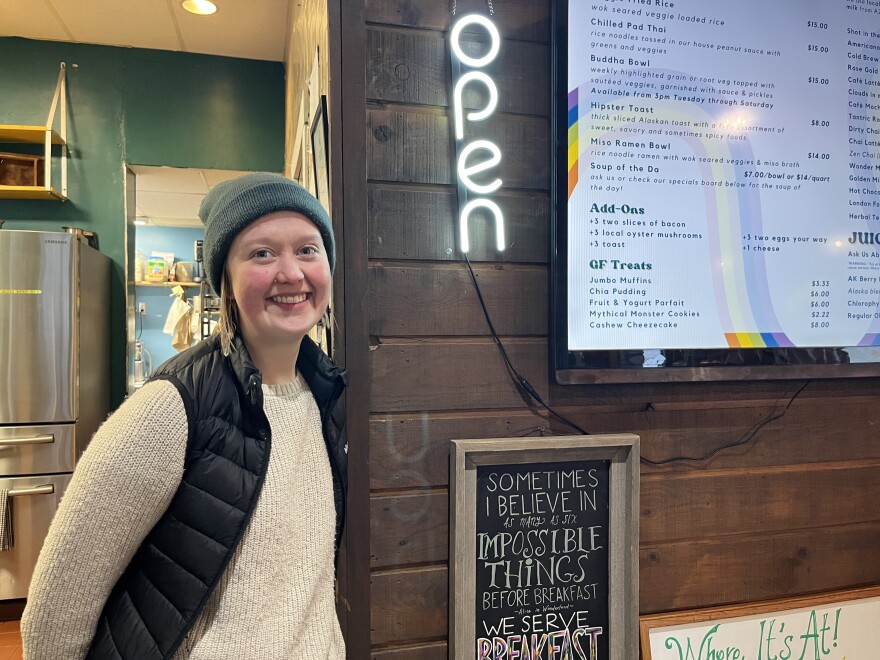From the excitement in Kim Keck’s voice, you'd think she just came across a pot of gold in the parking lot of Kaladi Brothers in Soldotna.
On Thursday, she was picking up three dozen eggs from Jacob Burton, of Poimea Farm in Sterling. Keck said she grew up with farm-fresh eggs, on the East Coast.
“The eggs are a beautiful golden yellow yolk,” she said. “They are not watery, they're fresh.”
Keck said you can’t get anything like these in the bigger chain stores. These days, you might not find any eggs in most grocery stores at all. There’s an egg shortage in Alaska and around the country, driven by the avian flu and high production costs for companies. The shortage is driving prices up and, in some cases, keeping cartons off the shelves altogether.
The shortage has impacted Ana Scollon, who runs The Goods, a sustainable grocery store in Soldotna. The Goods sells eggs from peninsula producers, alongside local produce and jars of fermented veggies.
Scollon said there are two direct consequences her store is seeing from the shortage.
“Number one, we certainly have more people asking for eggs,” she said. “And then the second part of that is we’re actually getting fewer eggs. Because our local producers who typically bring us eggs are being intercepted — friends and neighbors are buying them before they get here.”

Eggs were already in high demand at The Goods. Scollon said they get 15 to 20 dozen local eggs a week and they’ll routinely sell out, even in normal times.
But she said the shortage is sending a lot of people into stockpile mode.
“The response that I see most often is, ‘Ah! I’ve got to get all the eggs I can, because there aren’t enough eggs,’” she said.
She said that response makes sense. People are used to getting any food they want, any time.
But she hopes the shortages in the big stores instead make consumers think critically about their shopping habits and how they can build up the food systems in their own communities.
The last few years have shown food systems nationwide to be fragile. But producers at home can skirt around some of the issues caused by shipping woes and avian flu outbreaks thousands of miles away.
“Being involved and learning about where your food comes from, and maybe shifting some mindsets about expectations of what food should be available when,” Scollon said.
That sort of ethos is what inspired Jacob Burton and his family to level up their hobby farm last year and start selling.
“We had seen some cracks in the food system, if you will, that had given us some heartache,” Burton said.
Today, Poiema Farm has about 200 chickens and 80 ducks. They do egg pick ups every week at the coffee shop.
And Burton said he's found selling eggs, poultry, pork and lamb from his farm has been an opportunity to rally the community around food.
“What we found is that it's actually a better way to live, anyway,” he said. “To produce your food locally.”
This is the time of year the farm’s production is at the lowest. Right now, they’re producing about four dozen eggs daily. He said the farm can’t meet all the need from their customers, including The Goods.
“Right now, we’re turning away probably half the people who reach out to us,” he said. “Or at least they have to wait until the eggs are available.”
But to him, that enthusiasm points to people thinking more about where their food comes from — which he sees it as a progression forward. Eventually, he’d like to get more chickens, and make it his full-time job.
“We’re trying to express to people that it’s really important that you find local sources of poultry and eggs, specifically. But just local food is really important,” he said.
Buying a few hundred chickens isn’t the only way to contribute to the local ecosystem.

Scollon suggested asking friends and neighbors with chickens what they need. That could be especially poignant as the costs of feed and transportation skyrocket.
Kim Keck is doing her part as a poultry patron. She said eggs are in high demand in her household.
“Well my grandson needs to make brownies this afternoon,” she said Thursday. “And everyone in this house has been begging me. The last two eggs, my husband had this morning.”
As expected, her resupply is met with a lot of enthusiasm from her family. After the parking lot exchange, she followed up in an email. “My grandson is making brownies for his sixth grade class at Redoubt as I type this.” she wrote. "Happiness.”





